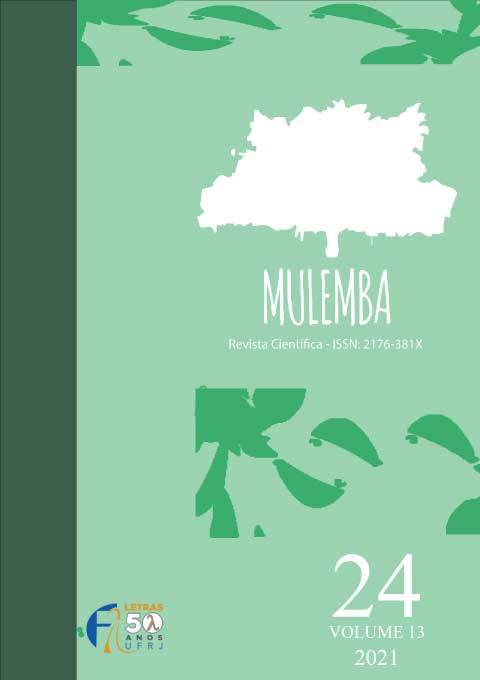A Adivinha em Chiwutee: Estruturas, Usos e Sentidos
DOI:
https://doi.org/10.35520/mulemba.2021.v13n24a41251Keywords:
adivinhas, géneros de discurso, Chiwutee, MoçambiqueAbstract
O presente artigo descreve 12 adivinhas dos Chiwutee da província de Manica, em Moçambique. Partimos da premissa que temos um interrogador que conhece os sentidos da adivinha e que questiona ao ouvinte, com sua anuência, com fim de obter respostas que cria uma identidade comunitária. Esse jogo de linguagem permite aferir a partilha de valores, crenças, regras e conhecimentos do interrogado, sobre a natureza e a cultura. Abordamos igualmente o período de enunciação, sua ordenação e funções da adivinha na sociedade Chiwutee.
References
ALTUNA, Raul. Cultura Tradicional Bantu. Luanda: Paulinas, 2006.
BAKHTIN, Mikhail. Estética da criação verbal. 4ª ed.. São Paulo: Martins Fontes, 2006.
CALVET, Louis. Tradição oral &tradição escrita. 2ª. ed. São Paulo: Parábola, 2011.
FINNEGAN, Rute. Oral literature and verbal arts: guide to research practices. New York: Routledge, 1992.
______. Oral literature in Africa. Openbook publishers, Cambridge, 2012.
JOLLES, André. Formas simples. São Paulo: Cultrix, 1976.
JUNOD, Henri. Usos e costumes dos bantu. Maputo: Arquivo histórico de Moçambique, 1996.
MIRUKA, Okumba. Encounter with oral literature. Nairobi: E. A.E.P, 1994.
OKPEWHO, Isidore. African Oral Literature. Bloomington and Indianapolis: Indiana University Press, 1992.
RAZÃO, Joaquim. Implicações sintácticas da co-ocorrência das extensões causativa e passiva em Ciwutee. Maputo: Dissertação de Mestrado- UEM, 2017.
SUANA, Eduardo. Introdução à cultura teve: reflexões sócio-culturais sobre o povo teve em Manica. Matola: seminário- filosófico interdiocesano “S. Agostinho”, 1999.
Downloads
Published
Issue
Section
License
Authors who publish with this journal agree to the following terms:
- Authors retain copyright and grant the journal right of first publication with the work simultaneously licensed under a Creative Commons Attribution License that allows others to share the work with an acknowledgement of the work's authorship and initial publication in this journal.
- Authors are able to enter into separate, additional contractual arrangements for the non-exclusive distribution of the journal's published version of the work (e.g., post it to an institutional repository or publish it in a book), with an acknowledgement of its initial publication in this journal.
- Authors are permitted and encouraged to post their work online (e.g., in institutional repositories or on their website) prior to and during the submission process, as it can lead to productive exchanges, as well as earlier and greater citation of published work (See The Effect of Open Access).

